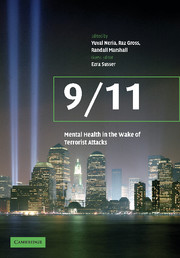Book contents
- Frontmatter
- Contents
- Acknowledgments
- Editors brief bio
- List of contributors
- Foreword
- Part I Introduction
- 1 Mental health in the wake of terrorism: making sense of mass casualty trauma
- Part II The psychological aftermath of 9/11
- Part III Reducing the burden: community response and community recovery
- Part IV Outreach and intervention in the wake of terrorist attacks
- Part IV A New York area
- Part IV B Washington, DC
- Part IV C Prolonged-exposure treatment as a core resource for clinicians in the community: dissemination of trauma knowledge post-disaster
- Part V Disasters and mental health: perspectives on response and preparedness
- Index
1 - Mental health in the wake of terrorism: making sense of mass casualty trauma
from Part I - Introduction
Published online by Cambridge University Press: 27 October 2009
- Frontmatter
- Contents
- Acknowledgments
- Editors brief bio
- List of contributors
- Foreword
- Part I Introduction
- 1 Mental health in the wake of terrorism: making sense of mass casualty trauma
- Part II The psychological aftermath of 9/11
- Part III Reducing the burden: community response and community recovery
- Part IV Outreach and intervention in the wake of terrorist attacks
- Part IV A New York area
- Part IV B Washington, DC
- Part IV C Prolonged-exposure treatment as a core resource for clinicians in the community: dissemination of trauma knowledge post-disaster
- Part V Disasters and mental health: perspectives on response and preparedness
- Index
Summary
On the morning of September 11, 2001, with the attacks on the World Trade Center (WTC) and the Pentagon, the world that many of us thought we knew, was altered. While thousands of people were directly exposed to or witnessed the attacks from close proximity, millions around the globe watched the events in real time or repeatedly over time on news channels. The attacks of 9/11 will likely be the most witnessed terrorist acts in modern history.
The events that unfolded on and after 9/11, and the subsequent terrorism around the globe have created a climate of fear and anxiety. These are the psychological outcomes that terrorists seek to inflict. Terror can only be effective if it leaves lingering concerns about safety; if it disrupts the most basic ways citizens manage and control their lives.
The overall goal of this volume is to document and critically examine the comprehensive and wide-ranging mental health response after 9/11. Specifically, this volume aims to examine:
Whether the research on the psychological consequences of 9/11 suggest a unique and substantial emotional and behavioral impact among adults and children.
In what way the impact of these attacks exceeded the individual level, affected communities and specific professional groups, and tested different leadership styles.
How professional communities of mental health clinicians, policy makers and researchers were mobilized to respond to the emerging needs post-disaster.
What are the lessons learned from the work conducted after 9/11, and the implications for future disaster mental health work and preparedness efforts.
- Type
- Chapter
- Information
- 9/11: Mental Health in the Wake of Terrorist Attacks , pp. 3 - 14Publisher: Cambridge University PressPrint publication year: 2006
- 6
- Cited by

